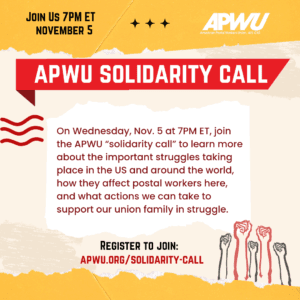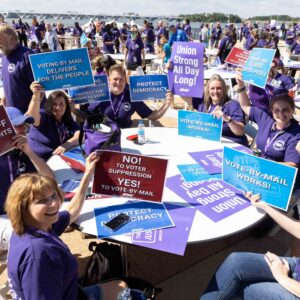July 1, 2017
Building Our Future – A Challenge, A Priority
(This article first appeared in the July-August 2017 issue of The American Postal Worker magazine)
By Northeast Regional Coordinator John Dirzius
As a proud member of the American Postal Workers Union since its birth in 1971, I have witnessed first-hand our development and growth into one of the largest and most aggressive unions in the labor movement. Over these past 46 years, our collective efforts have improved the standard of living of APWU members, all postal employees and workers in general.
We negotiated contracts improving wages, hours and working conditions for our members. Most recently, we negotiated provisions that provide a career ladder for non-career postal workers. We fought hard to keep management from performing our work and returned contracted-out work to our crafts. As members, we need to take great pride in our collective efforts; however, we must always look to the future to improve our advancements as postal workers and work to build the labor movement for future generations.
Empowering and educating our members, as well as developing new leaders are paramount challenges that must be priorities for the APWU. Working under a collective bargaining agreement is no longer the rule, but the exception. Organized labor only represents approximately 12 percent of the workforce, both public and private.
It is important to note that 25 percent of postal workers have been hired since 2011 and 53 percent of postal workers are eligible to retire. We need to reach the new generation of postal workers joining the USPS.
What It Means to Be Union
Today, the vast majority of workers in the United States do not work under a labor contract. They are “at will” employees, subject to the whims of management. Most young workers have limited union knowledge or experience.
We see this in our newly hired Postal Support Employees (PSEs). For many, it is their first time entering a unionized workplace. While the APWU continues to be successful in organizing our new PSEs as members, we collectively need to do more to educate these new members on what it means to be union and the importance of being a union activist.
It is our responsibility to show them what a labor union is, where our strength comes from, who the APWU belongs to, what collective bargaining is and what we mean by union solidarity.
There is no question that the APWU does a great job of training our leaders to provide our members with first-class representation. Our training is outstanding when it comes to contract enforcement, grievance writing, arbitration and union administration. At the national level, we have week-long training sessions, training at conventions and training at the All-Craft Conferences covering a wide-range of important topics. Our officers provide training at the regional level, at our state conventions and at the local level.
That’s great, and that kind of training should continue. However, as President Dimondstein stated in his 2016 Installation speech, the APWU must develop a “big picture” educational program to empower workers; to understand our history; to learn from our past; to organize the unorganized; to fight privatization; to understand politics and economics; to practice union solidarity everywhere and to rebuild the labor movement.
Developing an APWU National Institute
I have had the honor and pleasure to work on building the APWU’s broad-based educational program with other officers, staff, educators and activists. Our mission is to provide education at all levels of the APWU, in order to develop and promote an organizing model of the union that empowers members, educates members, develops future leaders, strengthens the APWU and builds up the labor movement.
Our concept is to create an APWU National Institute which would include week-long training sessions – with modules for new member orientation, trainings geared to members and stewards, as well as special modules for meetings and conferences. The week-long sessions would include assignments and projects, follow-through and mentoring.
The concept is to employ several different training methods to include popular education: short films/videos, song, theater, booklets/literature as well as cartoons and white board animation. We would include communication as an element of education by utilizing social media, digital communication, app technology, texting, online modules and union newsletters.
Training topics would include organizing unionism, grassroots leadership skills, history, income inequality, privatization, who controls our destiny, collective bargaining, diversity, social and political roles of labor unions, and the culture of resistance.
Any undertaking of this magnitude takes time, energy and money to fully implement. There are issues to resolve, hurdles to cross and curriculum to build; however, it is a challenge that must be accepted. My fellow Coordinators Sharyn Stone, Omar Gonzalez, Mike Gallagher and Kennith Beasley also support these goals of empowering our members, educating our members, developing labor leaders, and building and strengthening the APWU and the labor movement for future generations



